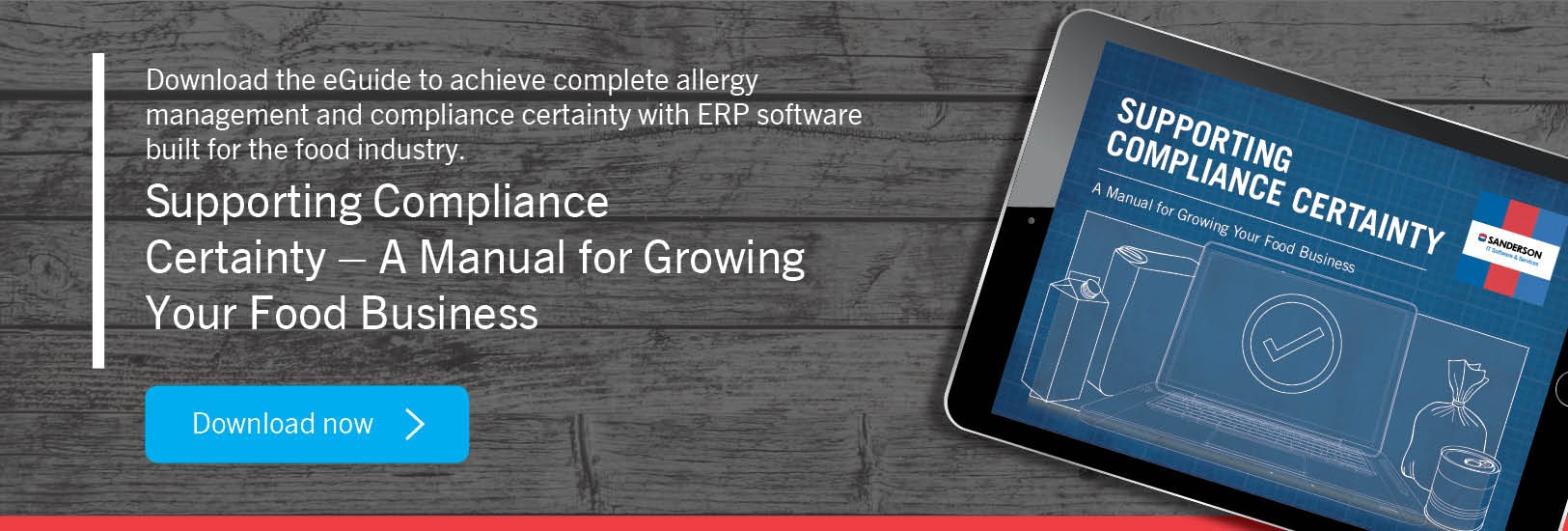Harnessing technology to manage allergens in food processing -- a competitive opportunity.
Compliance certainty is vital to manage allergens and to continue to secure orders for your food processing business.

Allergens receive an increasing amount of attention from both regulators and consumers, and retailers are looking for compliance certainty from food processors in order to instil confidence in their products.
For food processors, advanced allergen management is not just important from a safety and compliance angle, but also from one of profitability and competitive advantage too. Food processors cannot rely on manual processes or data silos that don’t deliver a real-time view of costs, or that can’t automatically control and track allergens in production processes and supply chains.
Those with robust industry-specific enterprise resource planning (ERP) software in place to provide true compliance certainty will gain a considerable commercial advantage.
EHA consulting sums up the issue well: “When it comes to food allergens, what you don’t know could hurt you - as a customer and as a business owner. Ensuring that a large number of potential customers can safely consume your food is a vital business practice.”
Indeed recent high profile cases have highlighted the tragic consequences of not having robust allergen management processes.
Within food processing, almost all areas have a regulatory responsibility. This includes staff, ingredients, labelling cleaning, storage, monitoring, and production – all are covered comprehensively by the Food Standards Agency. In fact, almost every stage and aspect of the whole food processing process needs to be brought into an effective allergen management programme. Food processors can expect regular, more stringent audits -- where visibility is key.

Strategic opportunity
Managing allergens within food processing is not just a compliance and risk management issue. Having a structured and robust process in place also presents a strategic opportunity to be seen as a leader and a (safe pair of hands) in this increasingly important field.
Having an effective system in place to manage allergens in food processing acts as a positive competitive differentiator and effects a positive reputational outcome and which in turn can lead to business growth.

Transparency and auditability is key
Getting it right and being able to show a proven process, demonstrates that you are taking allergens seriously and gives you a positive and proactive reputation. It also provides a commercial advantage, and can increase profitability -- those perceived to take allergens seriously stand more chance of being positively regarded within the industry, and are therefore awarded contracts with preference to those that merely pay lip service to it.
But how can food processors put into place something that is robust enough to both satisfy the regulator and protect end consumers -- instilling brand-leading confidence and future success?

Effective technology use
The process of implementing new software is not straightforward, but it is essential for food processors to achieve compliance certainty. EHA described it by saying that: “Processors must look critically at their system. Understand all the aspects of the facility like what happens in the warehouse, the delivery truck, the storeroom, the refrigerator, the preparation tables, the hot-holding boxes, or at the display cases.”
Technology can help by applying controls around material specifications and life management, new product development and succession, and allergens - within the same system. Ultimately, optimisation of business processes leads to better visibility.
ERP software can provide a business with a single system that offers visibility and management of inventory rotation, shelf life management, stock quality, and allergen management.
In short, this means that you can control and see what goes into the food and where it is within the warehouse. This is good for business operations, but crucially it means that you can always demonstrate a fully auditable process with integrated QA/QC controls and full two-way traceability at every stage. Not only is this good operationally, and in terms of efficiency, but it also means that you are always confident you can prove compliance.
Finally, though having such a system in place is critical across your business, it’s the compliance certainty that your business and your customers need, as audits become more stringent.
Key takeaways:
- Regulation around allergen management is becoming more stringent and requires greater control and visibility
- An industry-specific ERP solution can provide compliance certainty by controlling and tracing allergens, which is key across food production and the supply chain.
- Being able to show robust allergen management brings reputational gains and a competitive advantage to support business growth.

Topics: Food & Drink, Manufacturing



